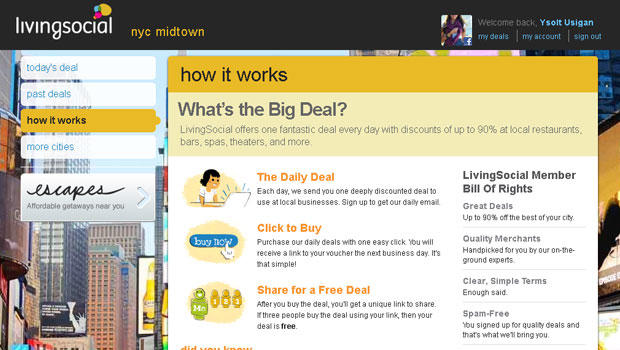Hello, LivingSocial (and the new wave of spending addictions you bring)
(CBS) - By now, you probably have gotten numerous emails from your friends asking you to join LivingSocial. What the deal?
This is how LivingSocial works: Every day, they'll send you one super-discount to a local business. All you have to do is sign up to get the daily email blast. Then you click to buy said deal, and a voucher will be sent to your email. But, it doesn't stop there. You can tell your friends about that awesome deal you got. If three of them buy it using your link, then your deal is free. So cool, right?
The only snag? These deals are so good, you can't say no. Before you know it, you find yourself eating at restaurants you'd never even try and shopping at stores you'd never even browse at. Okay, so that doesn't sound so bad. In fact, it's cool of these deals sites to open your eyes to new, awesome places where you can spend your hard-earned money.
The hidden danger is this: If you find yourself spending excessive money on things you don't need and start to feel buyer's (and credit cards') remorse from your constant spending, you may have a problem.
Before you add to your cart, consider these expert tips on spending wisely:
Buy only what you need
These online-deals sites do a great job of calling attention to things and experiences you don't need, stuff you had to have but didn't even know you wanted. "Ask yourself if you would have sought the product out if it hadn't appeared in your mailbox," Dr. Kit Yarrow, psychology chair at Golden Gate University in San Francisco, Calif. and author of "Gen Buy: How Tweens, Teens and Twenty-Somethings Are Revolutionizing Retail" (Jossey-Bass, 2009) advises. If you wouldn't have, refrain from clicking to buy.
Shop where you normally go
Make a list of your favorite stores and restaurants, says Jeff Brown, Harvard psychologist and co-author of "The Winner's Brain" (Da Capo Lifelong Books, 2010). "Only buy coupons you know you'll use -- not new clever suggestions that don't fall within your existing buying patterns," he adds.
Don't forget to compare
Richard Zwolinski, mental health and addiction counselor, and author of "Therapy Revolution: Find Help, Get Better and Move On Without Wasting Time or Money" (Health Communications, Inc., 2009), suggests you do some comparison shopping. "Is this a real deal?" he suggests you ask yourself. "Search other sites. Do not follow their time clock, but your own. If you don't have time to comparison shop, don't buy it."

